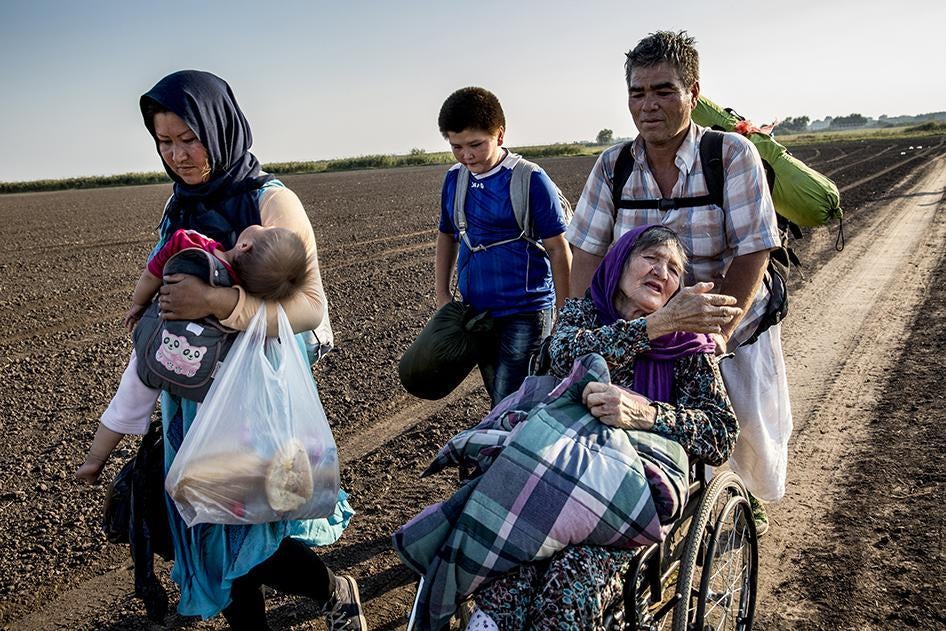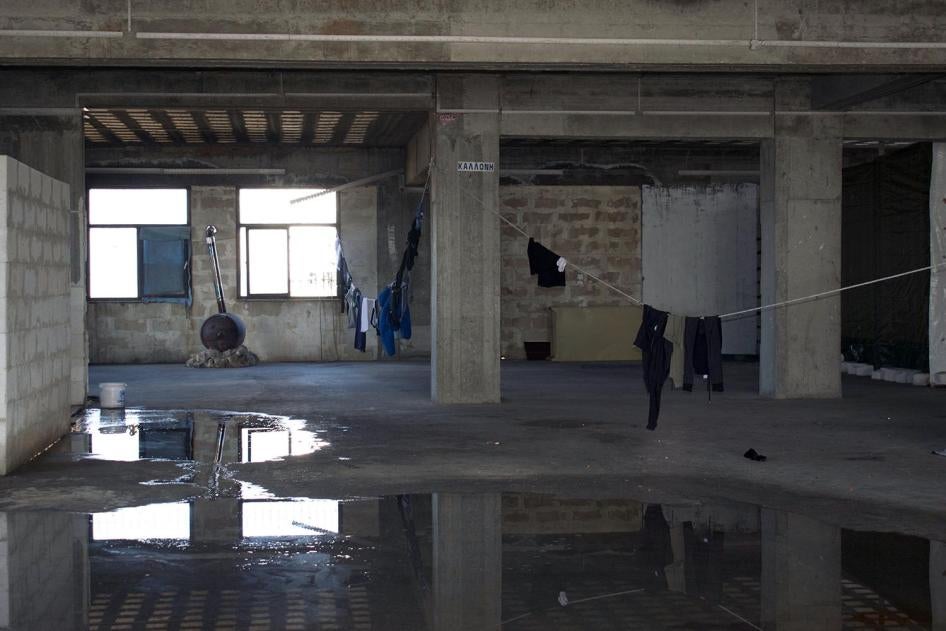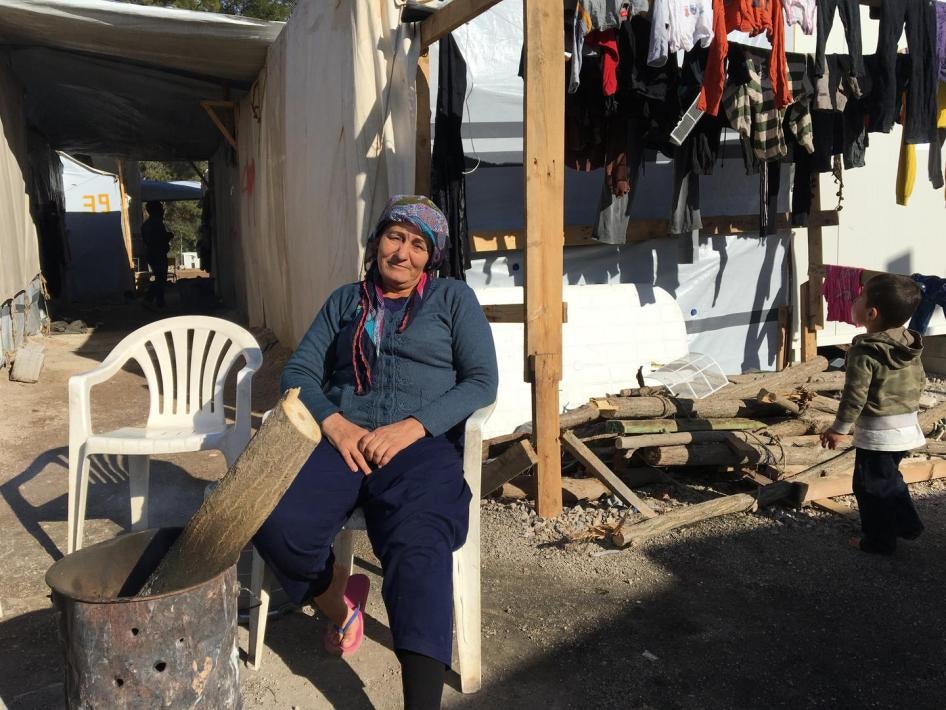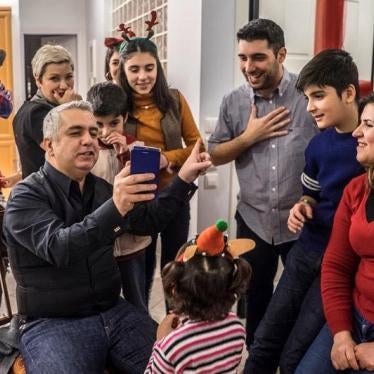(Athens) – Unnecessary delays and arbitrary barriers are keeping older refugees and asylum seekers stranded in Greece, unable to reunite with family members who have legal status in the European Union, Human Rights Watch said today.
Family reunification often focuses on minors and their parents. But hundreds of older refugees and asylum seekers currently in Greece who have fled war zones and persecution are waiting to learn if they will be allowed to reunite with adult family members who have been granted residency in another EU country. Although EU law provides for family reunification for older people, lack of clarity or explicit provisions governing the process means that they can remain in limbo, far from their family for prolonged periods of time.
“These older people, already victims of conflict and persecution, hoped to find protection in the EU after treacherous journeys to Greece, and to be reunited with their family,” said Bethany Brown, researcher on older people’s rights at Human Rights Watch. “Now they don’t know if they will ever see their relatives again.”
Under international human rights law, everyone has a right to family life. For refugees, asylum seekers, and migrants, the possibility of family reunification is an aspect of that right, but barriers, including lack of information and clarity around eligibility for reunification, is causing anguish amongst older people, Human Rights Watch found.
In December 2016, Human Rights Watch interviewed 13 older refugees and asylum seekers in four camps and one refugee squat around Athens. Nearly all said they were seeking to be reunited with family in other parts of Europe. Human Rights Watch found, however, that these people often face seemingly insurmountable legal and practical barriers to reuniting with their families. Almost all had been waiting in Greece for more than eight months. The barriers included: a narrow interpretation of family under national laws, misinformation, and confusion about the process.
While several barriers are common to all asylum seekers, they can have a more significant impact on older people. Older people have been shown, in some contexts, to have significantly higher rates of psychological distress than the general refugee population, and often suffer from health issues, injuries and violence during displacement, and frailty that can be exacerbated by time and uncertainty. One asylum seeker interviewed in December 2016 passed away before officials reached a decision on whether she could reunite with her children in Germany.
Barriers include lack of information about family reunification procedures for older people. Many of those interviewed said they had no idea about the status of their application or how to obtain information about it. In some cases, Greek Asylum Service officials who met with them had told them not to apply for reunification.
“Giselle,” a 63-year-old woman from Syria, told Human Rights Watch in December 2016: “I feel pain everywhere: in my head, in my stomach.... I wish to be established, to have the daughters of my sons around me.” She had been with her husband in a camp outside Athens since March 2016. “My granddaughter [in Germany] says ‘I want to break the phone to get through to you.’”
Greek authorities and other actors providing information to asylum seekers, including the United Nations High Commissioner for Refugees, and the International Organization on Migration, should inform anyone requesting asylum of their rights under the Dublin III regulation, the primary EU legal instrument establishing criteria and mechanisms for determining the member state responsible for examining an application for international protection. The information to be provided should explicitly include information about family reunification. Human Rights Watch and other organizations have documented serious gaps in access to information and legal assistance, particularly on the Greek Aegean islands, the main entry point to Greece for migrants and asylum seekers.
Human Rights Watch found an alarming lack of available data on older refugees. Despite repeated requests to the Greek Asylum Service, it has not provided data it says it has on the number of older refugees in Greece; the number of reunification requests; or the average length of time such procedures are taking.
In the short term, recognition and support for a relatively small caseload of older people stranded in Greece seeking to reunite with adult children and grandchildren would relieve suffering, Human Rights Watch said. In the longer term, better systems to address family reunification are urgently needed.
The Greek Asylum Service should identify and provide accurate and timely information to older refugees and asylum seekers on how they can reunite with family members. EU member states should ensure that procedures for family reunification are accessible and efficient for all eligible family members, as outlined by international law.
Faced with significant strategic challenges, EU governments and institutions responded in 2016 in ways that often undercut or set aside core values and rights protections rather than working consistently together to defend them.
Essential BackgroundA number of organizations working for refugees in Greece, including the UN High Commissioner for Refugees, have called for the protection of the right to family and speedy reunification by EU member states. They have criticized EU and national laws for defining “family” to mean only spouses and minor children (under 18 years old).
In an Action Plan published in December 2016, the European Commission recommended tougher measures aimed at increasing the number of returns of those stranded on the Greek Islands to Turkey, under a deeply flawed EU deal signed with Turkey in March 2016. One of these measures ended exemptions for vulnerable groups – which include older people – and people eligible for family reunification. The exemptions were aimed at protecting them from return to Turkey under this agreement. The measures in this Action Plan could have a serious impact on older people’s rights and well-being, Human Rights Watch said.
“Older refugees and asylum seekers should be able to enjoy family life,” Brown said. “The delays and barriers for older asylum seekers undermine the well-being and integration of communities across Europe.”
Accounts by Older Asylum Seekers
Older refugees and asylum seekers in Greece have been forced to leave their homes, their family lives shattered by war. Many spoke of the desperation they felt to reestablish their family relationships after losing everything else.
“Nesrin” is an older Syrian-Kurdish woman who was living in an outdoor camp with her daughter outside Athens when Human Rights Watch interviewed her in December 2016. She and her daughter are unclear about where Nesrin’s application to be reunited with her sons in Germany stands. Nesrin said she did not know her age but has tattoos on her face that she said her mother gave her when she was a baby “to make me beautiful.” This tradition was common until 50 years ago, according to historians. She told us she has slipped discs in her back, and walked with difficulty.
As she talked about her adult children, scattered around Germany, a Greek island, and Iraq, she started to cry and could not continue to speak. Her daughter said: “She is sick, and has been left here. They [officials] said that she can see her sons [in Germany], and then ‘No.’”
Nesrin added: “All of my bones are in pain. I want to die, I really want to die. [But before I do,] I just want to see my sons.”
“Adnan,” 59, an asylum seeker from Syria, has an adult son, daughter-in-law, and two granddaughters in Germany. He has an adult son and daughter-in-law with him in Greece, where he arrived in March 2016. Adnan has applied to join them in Germany, but is unsure about what process they used. He expressed his anxiety about being separated from his family, highlighting the way his family lived together in Syria and what he stood to lose.
At the time of our interview, in December 2016, he lived in a camp just outside Athens. He said:
We came all this way as a family; we fled Syria as a family. [When my son and I were separated into different households with different files during registration here in Greece,] we said, ‘This is not human....’ I begged. ‘You cannot separate us into two families.’ I went to another interview and told them the same. That guy [Greek official] said that my son should give my case number, and maybe we can be together.... We are one family. Why would they want to separate us? Every one of us must serve the other. We have learned to live together. In Europe, everyone is on his own.
“Gisele,” 63, whose young granddaughters live in Germany, said that when it came time for her interview with the Greek authorities, “I told them my children are in Germany, and that I raised my granddaughters who are now there, and I wish to go to them.” She was living in a camp outside Athens when Human Rights Watch interviewed her in December 2016. She said that the officials told her that they could not promise that she will be reunited with them. She told us that when her granddaughter [in Germany] talks with her on the phone, her granddaughter says: ‘I want to break the phone to get through to you!’ Gisele had not seen her sons, her daughters-in law, or her granddaughters for over a year.
“Mussa,” 60, was born in Afghanistan. At the time of our interview in December 2016, he lived in a tent camp outside Athens. He told Human Rights Watch he has three adult children in Germany. He lives with his wife, a son, 18, and a daughter, 19, who has a disability. Mussa told Human Rights Watch that he fled the Mujahedeen in Afghanistan in the 1980s and went to Iran, only to be later threatened by a government official. He spoke quietly and intensely about his family’s journey and his anxiety over separation from his 18-year-old son:
We left [Iran] because I have a daughter who was engaged to marry.… [H]er fiancé became important in his government ministry. He was coming every day with a cool car from the ministry, asking her for a walk. He stopped her from going to school. She was unhappy. So, I called the father of that man, and sought to cancel the engagement. I paid everything. He broke the legs of my two sons. In the end, he was a politician and I had a normal life, [so we had no choice but to] sell the house and car, and flee.
Here in Greece, I have not told anyone this story. We were on a [Greek] island for six months, and we have been here [in the camp] for three or four months. Our first interview [with the Asylum Service] will be in one month. We applied for family reunification, but we are worried about our son because he is 18. They [officials] told our daughter that she could stay [with us] because of her special needs, but they didn’t say that about our son. We can’t leave behind our 18-year-old boy. [I know of] another family with such a case.
Right to Family Life
The right to family in international law is enshrined in the Universal Declaration of Human Rights (Article 16 (3)), and key human rights treaties including the International Covenant on Economic, Social and Cultural Rights (Article 10 (1)), the International Covenant on Civil and Political Rights (Article 23 (1)), the Charter of Fundamental Rights of the European Union, (Article 33 (1)), and the European Convention on Human Rights (article 8). Under international law the definition of “family” is not restricted only to spouses and minor children. The European Court of Human Rights refers to social, emotional, and biological factors when assessing whether a relationship should be considered part of “family life.”
Older people have the right to have their applications reviewed within a reasonable timeframe that considers their specific needs. They are recognized as a vulnerable group under EU law, and are entitled to appropriate support commensurate with that status, including information about how to apply for family reunification. Greece has incorporated EU minimum standards for the reception of asylum seekers into its domestic law, which include requirements to support vulnerable people, including those who are older.
The EU law that determines asylum processing, known as the Dublin regulation, says that in accordance with EU human rights law, “respect for family life should be a primary consideration for Member States when applying this Regulation.” It also states that “in order to ensure full respect for the principle of family unity and for the best interests of the child, the existence of a relationship of dependency between an applicant and his or her child, sibling or parent on account of the applicant’s pregnancy or maternity, state of health or old age, should become a binding responsibility criterion.”
However, the definition of “family member” in the Dublin regulation is limited to spouses, or partners and minor children, while the definition of “relative” refers explicitly only to aunts, uncles, and grandparents of adults. Parents of adults are not listed in this definition. This omission leaves an important gap in the protection of older people’s rights.
The Dublin regulation explicitly states that older asylum seekers in Europe who depend on the support of a family member in another part of Europe should be kept or brought together.
Dependency is not defined in the regulation, but developed by each member state’s case law, and it provides the main basis on which older parents in Greece seeking refugee status who may have adult children in other parts of Europe can seek reunification. Dependency on an adult child can entitle them to be kept or brought together. The European Commission encourages member states to use this option “in the most humanitarian way.”
Practical Barriers
EU asylum processes are failing to properly respect or protect the right to family life of older refugees in Greece. Many older refugees and asylum seekers find their lives are on hold as they wait to learn if they will be reunified with family, with little information and great uncertainty. This issue has long been ignored. The refugee crisis in Greece is just the latest place around the world where this reality is unfolding.
As reports about the deteriorating mental health of refugees and asylum seekers still waiting in limbo in Greece are becoming common, many organizations, including the UN High Commissioner for Refugees, have been advocating quicker family reunification.
The European Court of Justice has ruled that family reunification procedures should provide guarantees of flexibility and promptness to ensure the right to family life is respected. Multiple EU states, however, use a narrow definition of family in assessing family reunification requests.
The organization Action Aid, in its recent advocacy on family reunification, criticized such narrow definitions for effectively breaking up “key support networks that are not only important to the asylum seekers themselves, but to the societies in which they will eventually be integrated.”
The UN High Commissioner for Refugees too, has been vocal about European countries’ narrow interpretation of family to include only nuclear members. It has advocated that: “[T]he concept of family should be interpreted flexibly by States, which could reflect strong and continuous social, emotional or economic dependency between family members, though which does not require complete dependence (for example, as in the case of spouses or elderly parents).” For older people, the last surviving family relationships may not be nuclear family members.
But the Greek Asylum Service has said to Human Rights Watch via Twitter that: “Member States reject such requests when not obliged to accept fam[ily] members.” And that it “sends relocation request[s] to MS [Member States] where the family is if [reunification] not applicable under Dublin. Both too slow.” This pace may become even slower. On May 19, 2017, it was reported by the media that the German Interior Ministry is planning to accept only 70 asylum-seeker family members per month.
The Greek Asylum Service’s chief of the Dublin Unit, Isa Papiliou, also acknowledged to Human Rights Watch that asylum seekers have experienced misinformation, legal and administrative blockages, problems obtaining and verifying documentation, and difficulty communicating across borders. She also noted that refugees and asylum seekers “may believe that the procedure via the [EU] embassies may [take less time] … the embassies have a legal basis [to provide] family reunification directive separately from [the] Dublin [regulation].”
Recommendations
- The EU, its member states, and, in particular, Greece should ensure that the right to family life for older beneficiaries of protection already in the EU is respected, including through family reunification, without onerous conditions or waiting periods;
- Greece should resist EU pressure to weaken protections for vulnerable asylum seekers – including older people eligible for family reunification – under the EU-Turkey agreement of March 2016;
- The European Commission should request the Greek government and its partner agencies to provide clear information from grantees about how the programs it funds in Greece benefit older people and other at-risk groups;
- Greece should reform the intake system for asylum seekers in Greece, by providing information on family reunification and access to legal aid for at-risk groups, including older people;
- The EU and member states, including Greece, should provide for speedier reunification for older people; and
- EU member states should increase the use of dependency determinations for older refugees in Europe seeking family reunification.
Methodology
The research is based on interviews Human Rights Watch conducted between December 16 and December 23, 2016, with 13 older refugees and asylum seekers in four camps and one refugee squat around Athens. This relatively small number reflects the difficulty in accessing formal data about numbers and locations of older refugees and asylum seekers, and their decreased visibility within each setting. Human Rights Watch identified most of those interviewed by word-of-mouth. Despite small numbers, there was similarity in their stories around the anxiety and uncertainty of family reunification, creating reason to believe that other older people have had similar experiences.
Each interviewee consented voluntarily to be interviewed. None received remuneration, a personal service, or benefit in return for the interview. Names of the interviewees have been withheld to protect their privacy and security.
Human Rights Watch also interviewed officials from the UN High Commissioner for Refugees and representatives of nine aid organizations and the Greek Asylum Service’s Dublin Unit between November 2016 and April 2017.












